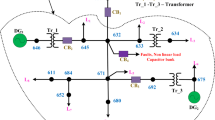Abstract
Currently, most utilities require the immediate disconnection of distributed generators in case of unintentional islanding, due to safety and technical reasons. However, there is a trend for allowing the islanded operation of distributed resources under specific conditions, so that the reliability of the energy supply to the consumers can be improved. In this case, the power quality inside the energized island must be assured by the distributed generators’ operators, which means that the transient and steady-state voltage and frequency of the isolated systems must be within acceptable limits. In this context, in this paper we proposed four indices for assessing the technical performance of the islanded operation of distributed generators. The indices are based on power quality issues, and they were proposed by considering the unplanned islanding of a synchronous distributed generator, its transition from the grid-connected mode to the islanded mode and the steady-state operation after a successful islanding. Results have shown the indices application to different operating scenarios, including a load shedding scheme, and they proved to be an interesting tool to technically evaluate the islanded operation of distributed generators, under a power quality perspective.



Similar content being viewed by others
References
Aghamohammadi, M. R., & Shahmohammadi, A. (2012). Intentional islanding using a new algorithm based on ant search mechanism. International Journal Electrical Power Energy Systems, 35, 138–147.
Ahangar, A. R. H., Gharehpetian, G. B., & Baghaee, H. R. (2020). A review on intentional controlled islanding in smart power systems and generalized framework for ICI in microgrids. International Journal of Electrical Power and Energy Systems,. https://doi.org/10.1016/j.ijepes.2019.105709.
Dalke, G., Baum, A., Bailey, B., Daley, J. M., Duncan, B., et al. (2011). Risks from utility supply disruption. IEEE Industry Applications Magazine, 17, 47–56.
El-Zonkoly, A. (2017). Optimal scheduling of observable controlled islands in presence of energy hubs. Electric Power Systems Research., 142, 141–152.
IEEE. (2011). IEEE guide for design, operation, and integration of distributed resource island systems with electric power systems. New York, USA: Institute of Electrical and Electronics Engineers. https://doi.org/10.1109/IEEESTD.2011.5960751
IEEE. (2014). IEEE guide for voltage sag indices. New York, USA: Institute of Electrical and Electronics Engineers. https://doi.org/10.1109/IEEESTD.2014.6842577
IEEE. (2019). IEEE recommended practice for monitoring electric power quality. New York, USA: Institute of Electrical and Electronics Engineers. https://doi.org/10.1109/IEEESTD.2019.8796486
IEEE. (2018). IEEE standard for interconnecting and interoperability of distributed energy resources with associated electric power systems interfaces. New York, USA: Institute of Electrical and Electronics Engineers. https://doi.org/10.1109/IEEESTD.2018.8332112
Jenkins, N., Ekanayake, J. B., & Strbac, G. (2010). Distributed Generation. London, United Kingdom: The Institution of Engineering and Technology.
Kundur, P. (1994). Power system stability and control. New York, USA: McGraw-Hill.
Marzband, M., Moghaddam, M. M., Akorede, M. F., & Khomeyrani, G. (2016). Adaptive load shedding scheme for frequency stability enhancement in microgrids. Electric Power Systems Research, 140, 78–86.
Mohamad, H., Mokhlis, H., Bakar, A. H. A., & Ping, H. W. (2011). A review on islanding operation and control for distribution network connected with small hydro power plant. Renewable and Sustainable Energy Reviews, 15, 3952–3962.
Mokhlis, H., Karimi, M., Shahriari, A., Abu Bakar, A. H., Laghari, J. A. (2013). A new under-frequency load shedding scheme for islanded distribution network. In 2013 IEEE PES Innovative Smart Grid Technologies Conference (ISGT), https://doi.org/10.1109/ISGT.2013.6497803
Oboudi, M. H., Hooshmand, R., & Karamad, A. (2016). Feasible method for making controlled intentional islanding of microgrids based on the modified shuffled frog leap algorithm. International Journal of Electrical Power Energy Systems, 78, 745–754.
Oliveira, D. Q., Souza, A. C. Z., Santos, M. V., Almeida, A. B., Lopes, B. I. L., et al. (2017). A fuzzy-based approach for microgrids islanded operation. Electric Power Systems Research, 149, 178–189.
Olivier, F., Aristidou, P., Ernst, D., & Cutsem, T. V. (2016). Active management of low-voltage networks for mitigating overvoltages due to photovoltaic units. IEEE Transactions on Smart Grid, 7, 926–936.
Razavi, S. E., Rahimi, E., Javadi, M. S., Nezhad, A. E., Lotfi, M., et al. (2019). Impact of distributed generation on protection and voltage regulation of distribution systems: a review. Renewable and Sustainable Energy Reviews, 105, 157–167.
Trindade, F. C. L., Meira, P. C. M., Freitas, W., & Vieira, J. C. M. (2010). Control systems analysis of industrial plants with synchronous generators during islanded operation. IEEE PES General Meeting,. https://doi.org/10.1109/PES.2010.5589547.
Trindade, F. C. L., Nascimento, K. V., & Vieira, J. C. M. (2013). Investigation on voltage sags caused by DG anti-islanding protection. IEEE Transactions on Power Delivery, 28, 972–980.
Acknowledgements
The authors acknowledge the National Council for Scientific and Technological Development (CNPq), under processes 306528/2015-0 and 474443/2013-2, for funding this research.
Author information
Authors and Affiliations
Corresponding author
Additional information
Publisher's Note
Springer Nature remains neutral with regard to jurisdictional claims in published maps and institutional affiliations.
Appendix 1 Restriction time calculation, \(t_{REST}\)
Appendix 1 Restriction time calculation, \(t_{REST}\)
The restriction time (\(t_{REST}\)) is the only index associated with DG protection and was proposed by Trindade et al. (2010). The restriction time is calculated by several simulations of electromagnetic transients in which the time of changing the post-islanding control mode is gradually increased. For each change in the instant of the DG control mode conversion (PQ to f-V), it is checked whether the frequency relay disconnects the DG. If the relay operates, the change time used in the previous simulation is determined as the restriction time for the current active power imbalance level. Otherwise, the DG control conversion time is increased and new simulation is performed to check if frequency relay is operated or not.
This process is repeated until the restriction time for the current level of active power imbalance is obtained. It is noteworthy that the process developed in Trindade et al. (2010) to determine the restriction time was the same applied in this study.
Rights and permissions
About this article
Cite this article
Lima, R.L., Vieira, J.C.M. Performance Indices for Assessing the Power Quality of Islanded Operation of Distributed Generators. J Control Autom Electr Syst 32, 747–755 (2021). https://doi.org/10.1007/s40313-021-00698-w
Received:
Revised:
Accepted:
Published:
Issue Date:
DOI: https://doi.org/10.1007/s40313-021-00698-w




